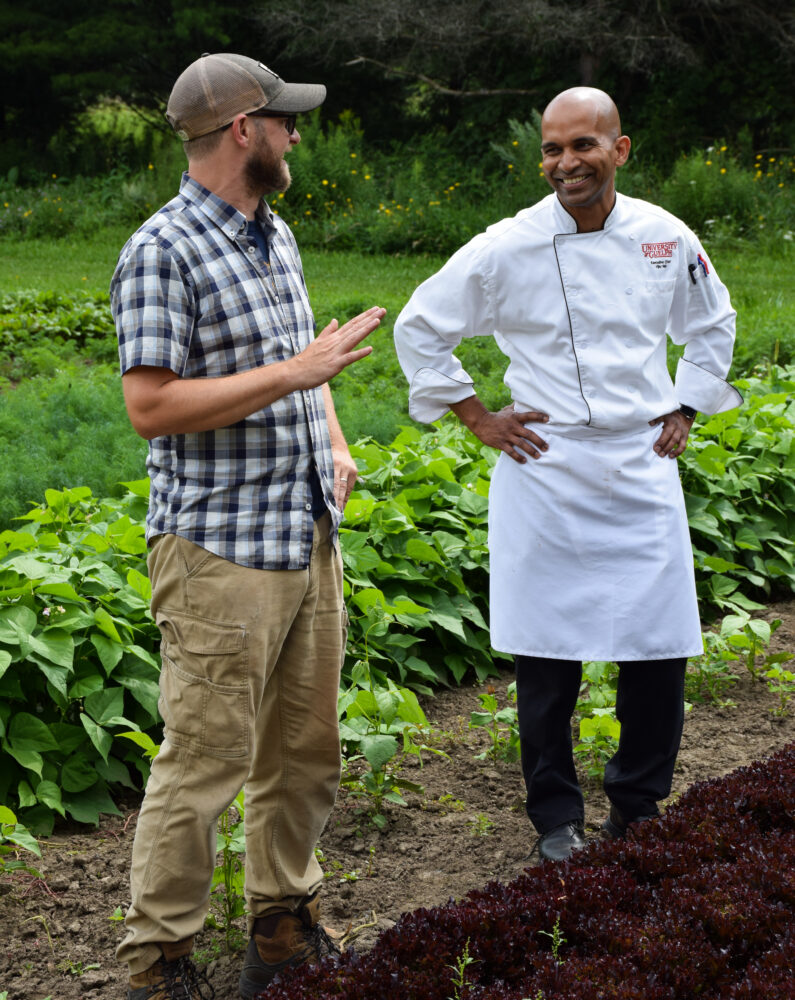University of Guelph delights are now available “to go” forever, thanks to the launch of a new cookbook, Flavours of Guelph: Cooking in Season, by the culinary team at U of G’s Hospitality Services.
The collection of recipes, from comfort foods to innovative dishes, includes U of G classics like Creelman Bake Shop’s banana bread, gingered butternut squash soup, herb-roasted chicken with honey and mustard, homemade pickles and more.

As its recipes are divided by season, the book inspires readers to cook with seasonal and locally sourced ingredients while learning the stories behind the dishes.
Available to purchase at the U of G Bookstore (in softcover and hardcover versions), the book was also sold at convocation ceremonies June 11–14 and will be on sale during Alumni Weekend.
A portion of the proceeds from the sale of this cookbook will be donated to the Guelph Student Food Bank, which supports students’ access to nutritious food.
U of G has long been renowned for having fresh, innovative food, with several surveys ranking it as the “best campus food in Canada.” Behind the cookbook recipes are U of G’s award-winning chefs, who have recently taken home top prizes at international culinary competitions.
Executive chef Vijay Nair, who oversees 20 food locations across campus and four core residence dining halls, writes in the introduction:
“We champion food with a conscience, making seasonally indulgent menus that align with Canada’s Food Guide. Our made-from-scratch dishes tell stories – of respecting our land, oceans, farms, and international flavours.”

Herb-roasted chicken with honey and mustard (Cooking in Season)
Award-winning campus food from U of G Hospitality, Canada’s top university food service
U of G Hospitality is distinct for its collaboration with local farmers and across all U of G operations, with many of the ingredients grown right on campus and 45% of buying spent on local produce.
The Hospitality team sources ingredients from five producers in Ontario, with the majority of chicken and beef products and all milk coming from within the province.

Highlighted in the cookbook, these partnerships across campus are plentiful and vital to building a sustainable food culture:
The Guelph Centre for Urban Organic Farming a one-hectare “living laboratory” in the Department of Plant Agriculture, provides a few thousand pounds of vegetables, lessening the footprint of the food required from suppliers.
Hospitality chefs check in regularly with the farm to see what is growing and design a menu around what is available, rather than writing a menu and shopping for it.
Chefs also tend to U of G Chef’s Garden, located beside Edmund C. Bovey Greenhouses, nurturing a diverse range of aromatic herbs and fresh produce, including cherry tomatoes, eggplants and hot peppers.
Partnerships with the U of G Sustainability Office have helped divert over a quarter of a million kilograms of food scraps from landfills via a campus composting program.
The Guelph Food Innovation Centre in the Department of Food Science also helps chefs scale up to serve the University population, putting to use 300-litre kettles in the production facility.
The new cookbook allows the community to experience the fruits of these partnerships first-hand and understand what makes the food at U of G among the best in Canada.
“We are privileged to be able to serve the University community,” says Nair. “It allows us to reflect on the importance of the food culture on campus. It drives us to learn and draw inspiration from the world around us to create a more sustainable food future.”
